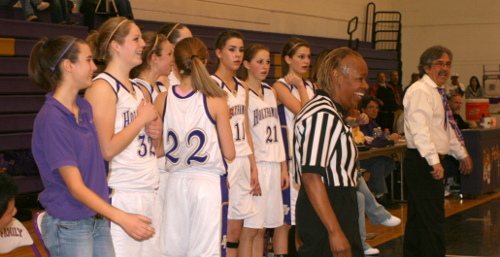Next Man Up. This seems to be the new buzzword phrase in modern sports. Especially in football, each week there is an injury and coaches talk about the replacement needing to step in and take over and produce at a high level. It seems this expectation comes with the territory and is placed upon an aging veteran or a new rookie. Be ready to play at any moment and play at an extremely high level.
Have you looked around your officials association meetings recently? Can you identify the next man, or woman, up for you?
Most officiating groups have two main issues they face: 1) getting people interested in officiating and 2) training them for the varsity level. If these aren’t issues your group is facing, congratulations! (We would welcome your story telling officials how you overcome these challenges. We also welcome your comments on this story about your ideas for recruitment.)
Decades ago, new officials took their sports exams each year knowing the road to varsity contests was long, but worth the trip. The year I took my football exam, 24 officials were in the room and this was one of more than a dozen sites offering the test. The room for the basketball exam was even more crowded. Today’s new official isn’t even required to drive to a location to take the exam. They are offered electronically and can be completed from the comfort of home. Yet, there are still fewer people to take the exams today, let alone actually walk on the court or field to officiate a contest.

Some areas do report good numbers applying for officiating licenses. The demographics show these tend to be men, around 40 years of age, looking to pick up a few bucks and stay active now that their children are no longer involved in sports. While current officials should welcome them, are they really our future?
I have the opportunity to meet and talk with dozens of high school age students each year through a number of non-officiating activities. I often ask them about their interest in sports and if they would consider officiating. If you haven’t done this with children in your social circles, please do. The responses border on terrifying!
“Why would I want to do something where people yell at me all the time?”
“Are you kidding? They are killing referees now. I’ve seen it on the news!”
“I would consider it if I didn’t need to work all those little kid’s games. Can you start at varsity?”
“I would only want to work at my school. I could help them win some games.”
“How much do you get paid?”
“It would give me a chance to throw out some of the coaches I hated when I played.”
I don’t know if this is more of a statement on society or officiating. It certainly is a statement on the perception of officials coming from high school sports and those involved. Most of the veteran officials I know look back on their high school participation with fondness and great memories. Staying attached to the game was always part of their plan. When and why did that change?
What are we as officials doing to demonstrate to today’s young athlete that being a part of the game as an adult has value? Are we being good role models on the court, the field or arena? Have you taken the time to make sure you have encouraged at least one new official so when you step aside, they are next up?
Sports officiating will not market itself. Too much of the attention the “stripes” or “blue” get in the media are negative stories. They focus on the missed call, the argument and sadly, the assault. It is our responsibility as the men and women of the avocation, to sell the next generation on our work. The friendships, rewards, and the positive influence we can have are all the reasons we do this. Sure, sometimes the money helps us pay for something nice. Sometimes our work is recognized with a state final assignment or a flattering article in the local paper. We may even get a little ego stroke from our friends that look to us with a small amount of respect for what we do.
We must share our feelings about officiating with young athletes. We need for them to feel the pull, or calling, as we once did. We need them to stay involved in high school sports and bring their skills and abilities to this role. It isn’t up to the parents. It isn’t the responsibility of the coach. This task rests squarely on the striped shoulders of each us. If we aren’t reaching back to bring a new official forward, there won’t be a next man up.
Dave Sheets
David Sheets, a licensed basketball, football and volleyball official from Indiana, is the chairperson of the NFHS Officials Publications Committee. Sheets recently earned the designation of “Master Cooperative Communicator” from the Cooperative Communicators Association.
Most Recent Articles
- nfhs news NFHS Learning Center Delivers 25 Millionth Course
- Track & Field/Cross Country article Effective Communication with Athletes and Coaches
- nfhs news Player Equipment Changes Highlight 2025 High School Football Rules Revisions
- Player Equipment Changes Highlight 2025 High School Football Rules Revisions
- nfhs news Judgment Call on Second Contact Eliminated in High School Volleyball






